Ukraine says with new offensive, it can reclaim territory lost to Russia — but is that realistic?

The way the Kremlin appears to see it, the southern Ukrainian port city of Kherson on the Dnipro River has already been subsumed into the Russian Federation.
Home to 280,000 people before the Feb. 24 invasion of Ukraine, Kherson was the first major population centre in the embattled country to fall to Russian troops, and its Russia-appointed administrators have expedited efforts to erase all signs of Ukrainian sovereignty.
They have distributed Russian passports to residents, introduced Russian banks, brought in Russian mobile phone companies and made the ruble the legal currency, replacing the Ukrainian hryvnia.
But with the war days away from entering its sixth month, Ukrainian authorities are signalling that the time is fast approaching when its military will attempt to retake the captured city and expel its Russian occupiers.
President Volodymr Zelenskyy and members of his administration have urged civilians to get out of the way.
"I know for sure that there should not be women and children there, and that they should not become human shields," Deputy Prime Minister Iryna Vereshchuk said recently.
Kherson key to both sides: retired colonel
For the last six weeks, piecemeal Ukrainian assaults have chipped away at Russian-held territory in the country's south, allowing its soldiers to get within 20 kilometres of Kherson.
"Forty-four settlements have already been liberated in Kherson Oblast," Dmytro Butriy, the acting head of the region's military administration, told an online news conference in Kyiv on Thursday.
"The situation there is difficult," he continued, claiming the destruction from Russian shelling is "massive" and that homes, schools and many other buildings have been damaged.
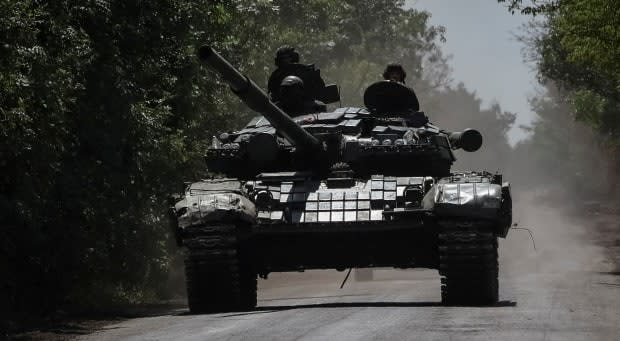
But whether that's as far as the counter-offensive gets and how much force Ukraine's military can muster after weeks of bruising fighting in the southeastern Donbas region remains unclear.
Retired Ukrainian colonel Serhiy Grabsky argues that the fate of Russian President Vladimir Putin's war hinges on his military holding Kherson — and of Ukraine being able to pry it away.
"That location will open the door for the liberation of all of the country and the termination of all of Russia's strategic goals," said Grabsky, who served in several international roles over a 28-year career, including as a military adviser to the Iraqi government.
He said pushing Russia out of Kherson would end any threat to Ukrainian cities, such as Mykolaiv and Odesa, and put Russian military installations in the Crimean Peninsula within reach of Ukraine's new Western weaponry — including long-range American HIMARS rocket launchers.

"We could put under 'fire control,' as we call it, all the exits from Crimea," Grabsky said.
While Russia is waging war along a vast 1,000-kilometre front, most of its forces are concentrated in the Donbas region, where both sides have been locked in a vicious contest of attrition.
Russia has gained territory, including the cities of Lysychansk and Severodonetsk, but at considerable cost in its soldiers' lives and equipment.
HIMARS surpasses Russia's arsenal
Grabsky said the southern front, which includes Kherson, is stretched thin, with Ukrainian and Russian forces more or less evenly matched.
That's why, he said, Ukrainian commanders see an opportunity to mass their forces and break through Russian lines.
"I'm absolutely optimistic," he told CBC News.
WATCH | Kherson residents describe strict conditions living under Russian control:
Estimates of Russian military losses since Feb. 24, when Russia invaded Ukraine, range from a high of almost 37,000 dead — as claimed by Ukraine — to closer to 15,000 or 20,000 based on estimates from the United States and Britain.
However, Ukraine has also suffered heavy casualties, including up to 200 soldiers killed in action every day at the peak of the fighting for Severodonetsk, where Russia eventually triumphed.
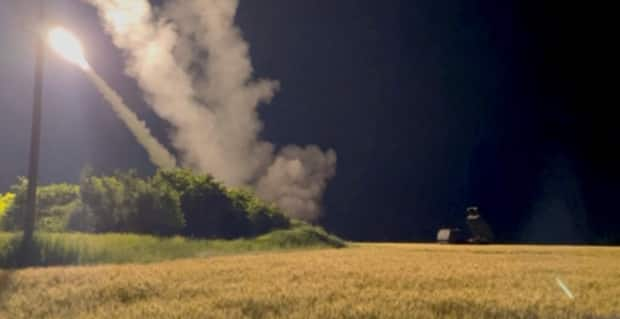
Rather than a full assault on Kherson, Grabsky said he expects Ukraine will continue with a "gentle push" of its forces, to choke off supply routes into the city and eventually cut it off.
Of late, Ukraine has been using its high mobility artillery rocket system, or HIMARS, to disrupt Russian supply centres deep inside occupied territory, including several ammunition depots.
The U.S. has provided Ukraine with eight HIMARS so far, with four more to come. The rockets are able to hit targets at a distance of more than 80 kilometres with pinpoint accuracy — far beyond the capabilities of anything Russia has in its arsenal.
Footage shared by Ukraine's Defence Ministry showed what it claims was the obliteration by precision fire from HIMARS of a Russian ammo dump in Nova Kakhovka, near Kherson. And earlier in the week, Ukraine claimed the same system struck a Russian command post, killing a number of senior officers.
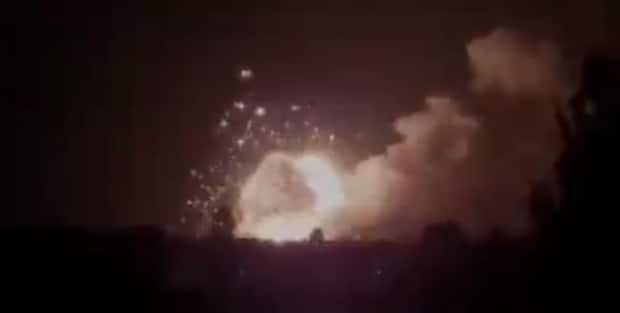
If Ukraine can mount a counter-offensive in the south that leads to the liberation of Russian-held territory, it would be the first such success for Ukraine's military since the February invasion.
By comparison, when Russian troops were driven out of the Kyiv area and parts of northern Ukraine around Kharkiv in April, it was after their own offensives failed.
Other military observers, though, remain wary about predicting a Ukrainian breakthrough in Kherson.
Russia's 'grinding' campaign effective
Retired four-star U.S. air force general Philip Breedlove, who served as NATO's Supreme Allied Commander in Europe from 2013-16, told BBC Radio's Today program this week that Russia's "grinding, indiscriminate" campaign to wear down Ukraine's military and civilian infrastructure has been effective.
However, he said, Ukraine can likely still bring a sizable army to bear against Kherson.
"They don't have the massive manpower that Russia has across its nation, but I would tell you Ukraine has far more experienced soldiers than Russia does. That is in Ukraine's favour," Breedlove said.
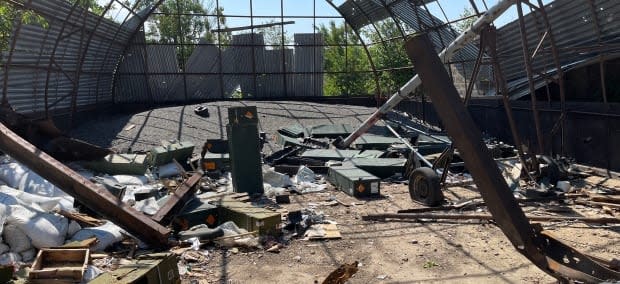
Rob Lee, an analyst at the Foreign Policy Research Institute in Philadelphia, who has meticulously tracked the course of the conflict, suggests Ukraine will need more help of all types from the West if an offensive is to succeed.
"Kyiv will likely require a more robust training program and ammunition if it is to retake a sizable amount of territory," he wrote in a post on Twitter.
Phillips O'Brien, a professor of strategic studies at the University of St Andrews in Scotland, said it appears Ukrainian commanders have decided there's more to be gained by focusing on Kherson than by counterattacking in the Donbas, where Ukraine has been steadily ceding territory.
"I would think by the end of the summer, without a doubt, they want to be shown to be doing something, that it's not a stalemate," he told CBC News.
Away from the battlefield, Russia has increased the pressure on European nations such Germany by restricting gas supplies. It's also blocking Ukrainian grain shipments from leaving ports on the Black Sea, creating a global food crisis.
The Kremlin appears to be hoping the ongoing pressure will undermine Western resolve to help Ukraine and will convince the Ukrainians to accept Russia's terms for surrender.
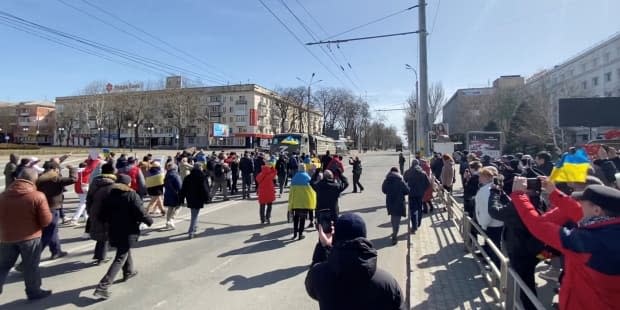
Conversely, if Ukraine can demonstrate that a significant battlefield victory over Russia is possible, it's in a stronger position to demand more Western help, O'Brien said.
Kherson is "where they should be able to attack with the greatest chance of success — when they're ready."
'We are in an attritional phase'
Putin has repeatedly scaled down his stated objectives for his invasion of Ukraine.
At first, the lightning assault on Kyiv with paratroopers in the early hours of the war appeared aimed at capturing the capital and decapitating the Zelenskyy government.
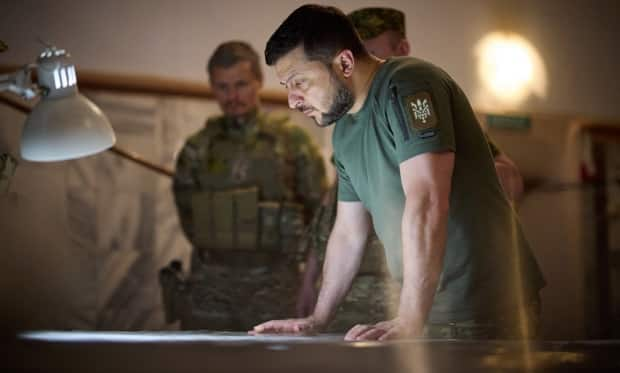
Then, after Russian troops suffered heavy losses and withdrew, Putin's commanders reframed the war as a fight for the provinces of Luhansk and Donetsk in the Donbas region.
However, despite making some territorial gains, Russia's military has not been able to push Ukrainian forces out of the eastern region, nor stem heavy losses on its own side.
"We are in an attritional phase. And the attritional phase will have to end at some point," O'Brien said.
"I think when it ends, it will end quickly because the [front] line will be too weak, and there has to be a major adjustment."
Grabsky, the retired Ukrainian colonel, said he believes HIMARS could be what shifts the balance of the conflict in Ukraine's favour.
"The intensive strikes against Russia's logistical system really means that day by day, Russians will lose their ability to advance into Ukrainian territory," he said.


